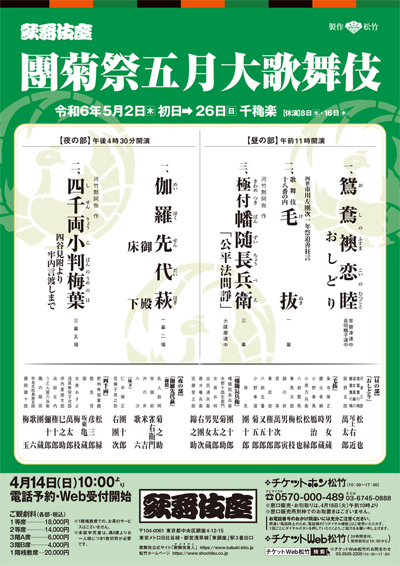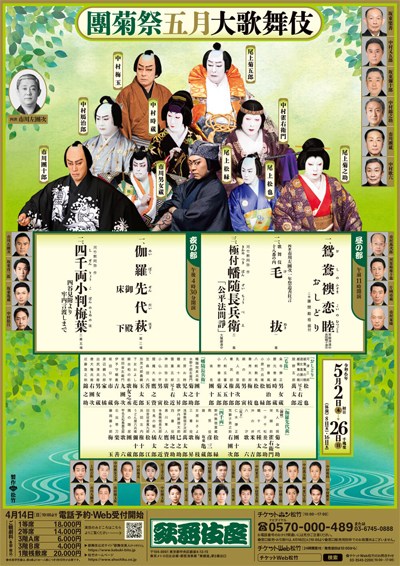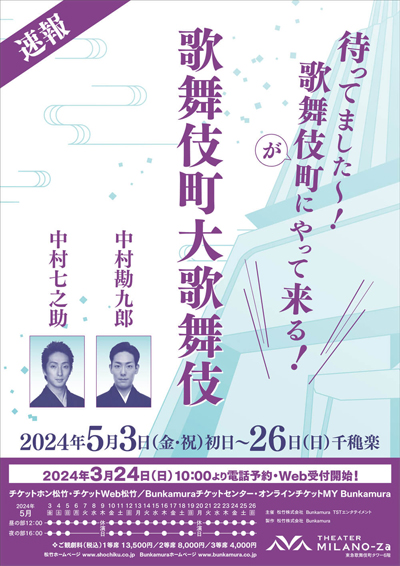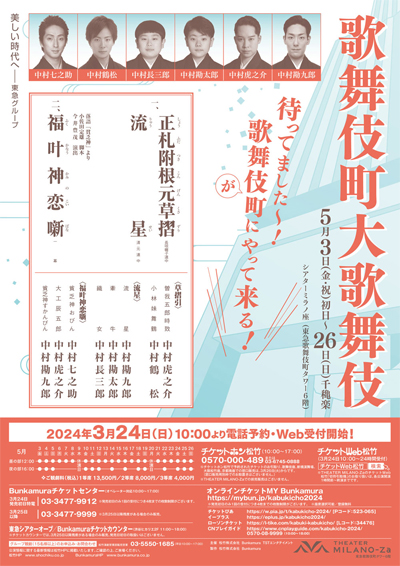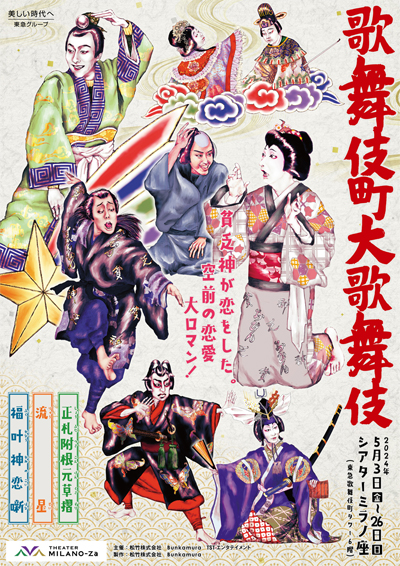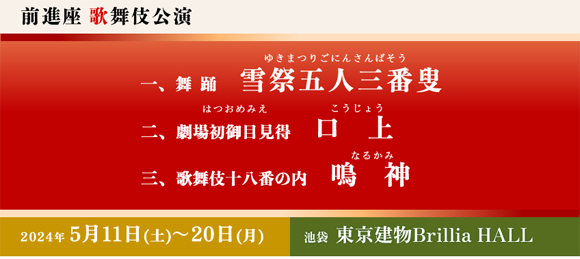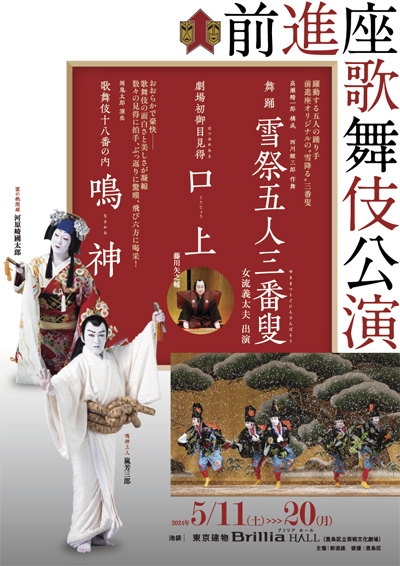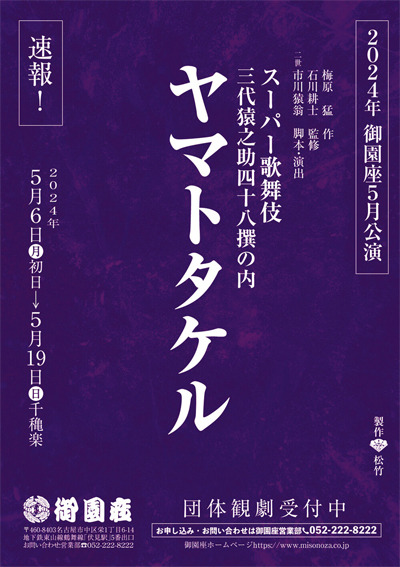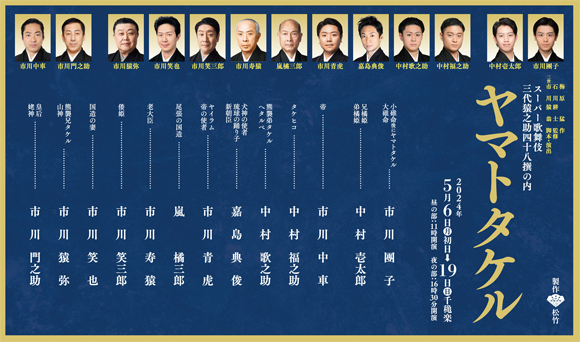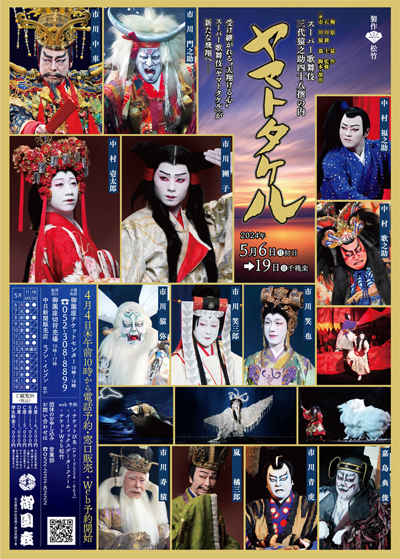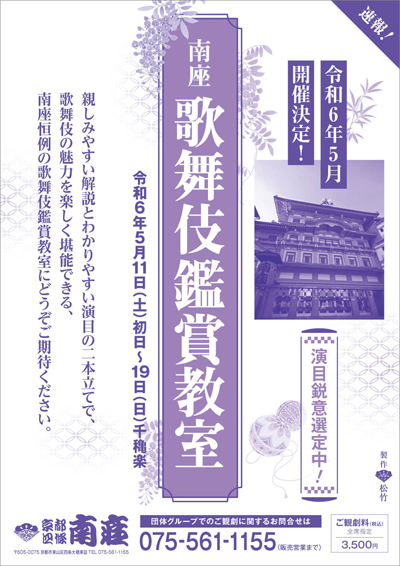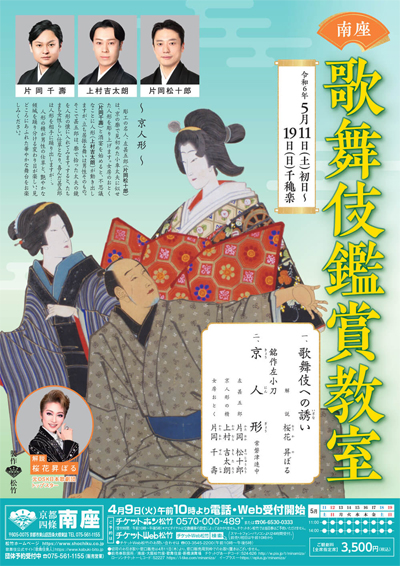| Casting |
Living National Treasure Onoe Kikugor˘, Living National Treasure Nakamura Baigyoku, Living National Treasure Nakamura Karoku, Onoe Kikunosuke, Ichikawa Danjűr˘, Nakamura Tokiz˘, Nakamura Jakuemon, Nakamura Ganjir˘, Nakamura Kinnosuke, Onoe Sh˘roku, Band˘ Hikosabur˘, Nakamura Matagor˘, Ichikawa Omez˘, Ichikawa Udanji, Nakamura Kotar˘, Ichikawa Danz˘, Band˘ Yajűr˘, Band˘ Minosuke, Onoe Matsuya, Onoe Ukon,
Nakamura Baishi, Nakamura Yonekichi, Ichimura Manjir˘, Kawarasaki Gonjűr˘, Nakamura Mantar˘, Ichikawa Otora
|
| Comments |
The great yearly Dankiku festival is back at the Kabukiza!
This important festival for the Naritaya and Otowaya guilds commemorates 2 great stars of
the Meiji era: Dan = Ichikawa Danjűr˘ IX
and Kiku = Onoe Kikugor˘ V.
Oshidori:
(The Lovebirds)
A rare performance of a dance showing two men fighting over a beautiful woman in the
guise of a sum˘ match only to show that the
woman and one of the men are actually the spirits of birds, conjugal birds that are an
image of faithful love. Starring Onoe Matsuya, Onoe Ukon and Nakamura Mantar˘.
Kenuki: in this play, which retains the light, festive atmosphere of
early-period Kabuki, a princess has a mysterious ailment that makes her hair stand
on end, an ailment that prevents her from carrying out her long-awaited marriage.
Kumedera Danj˘ comes from the groom's household to investigate and finds a plot
to take over the household when his tweezers float in mid-air.
Ichikawa Omez˘ stars in a play that features the bombastic aragoto
style of acting that is a specialty of his family.
Featuring also Living National Treasure Onoe Kikugor˘, Nakamura Tokiz˘, Nakamura Ganjir˘, Onoe Sh˘roku, Nakamura Matagor˘, Ichimura Manjir˘, Onoe Matsuya and Nakamura Baishi.
Banzui Ch˘bŕ: in the early Edo period,
gallant men like Banzuiin Ch˘bŕ led the commoners.
But this incurred the wrath of members of the samurai class,
who were theoretically in control. This play begins with a recreation of Kabuki
in its earliest days, then a fight breaks out which is settled by
Ch˘bŕ (Ichikawa Danjűr˘). But this frustrates the ambitions of the samurai
Mizuno (Onoe Kikunosuke) who invites Ch˘bŕ to visit. All of Ch˘bŕ's men tell
him not to go because it is a trap, but Ch˘bŕ decides to meet his end
and bids farewell to his wife (Nakamura Kotar˘) and son. Finally, Ch˘bŕ is
killed when he is defenseless in the bath. Featuring also Ichikawa Udanji, Nakamura Kinnosuke and Ichikawa Omez˘.
Meiboku Sendai Hagi: this play is about the attempt to take over one of
the most famous samurai households in the Edo period, the Date clan
ruling Sendai, a scandal that caused a sensation in its day.
After the death of the lord of the clan, his young heir is the target of
villains. Masaoka (Onoe Kikunosuke), the boy's nurse is desperately afraid that he
will be poisoned. She refuses to let anyone see him who might try to
assassinate him and attempts to keep him safe in the women's quarters
where men are forbidden. She even fixes his meal in her quarters using
her delicate tea ceremony implements to cook rice. The plotting faction does
not give up, though, and sends poison in the form of candy as a present
from the Sh˘gun. Masaoka's son Senmatsu sacrifices his life for the young
lord by eating the poisoned candy, and when he is killed by the evil Yashio (Living National Treasure Nakamura Karoku),
Masaoka thinks only of protecting her lord. Her fierce devotion to duty convinces the
plotters that she is on their side. Masaoka's actions help save the young lord,
and only when she is alone can she grieve for her son.
As another faithful retainer Otokonosuke (Ichikawa Danjűr˘), stands guard underneath
the room, the evil Nikki Danj˘ (Ichikawa Danjűr˘) appears as a giant rat, but then
slips away, walking calmly through the clouds.
Featuring also Nakamura Jakuemon (Sakae Gozen) and Nakamura Yonekichi (Okinoi).
Shisen Ry˘:
(Four Thousand Gold Coins)
In this play loosely based on a true incident, two men, Fujioka T˘jűr˘ (Living National Treasure Nakamura Baigyoku) and Yashű no Tomiz˘ (Onoe Sh˘roku),
the former a masterless samurai, the latter a seasoned thief,
break into the treasury of the Shogunate and steal the immense sum of four thousand gold coins.
Though the samurai tries to use the money to support a normal life by starting a loan business, the other wastes
his money gambling and resorts to extorting money from his former partner. The enormity of their crime makes it
impossible to keep it secret and they are soon caught. Written by Kawatake Mokuami,
this play caused a sensation in its day for its realistic depiction of a Meiji period jail.
Featuring also Living National Treasure Nakamura Karoku, Ichikawa Danz˘, Band˘ Hikosabur˘, Band˘ Minosuke, Nakamura Baishi, Band˘ Yajűr˘, Band˘ Kamez˘ and Nakamura Mantar˘.
Sources: Earphone Guide Website or Sh˘chiku Kabuki Official Website
|

